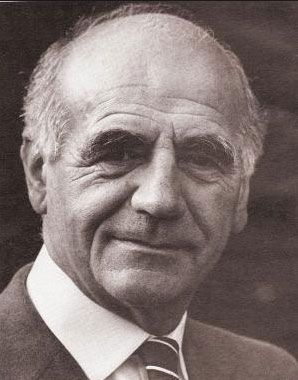I was priveliged to have known Ralph Vibert in his latter years and will always remember our numerous chats when he popped into my shop for a coffee and a chat whilst his wife Christine went across the road to have her hair done. We first met when one of his daughters attended a Family History Exhibition where I had the St Peter tree on display. As a result I was invited to his home and took the family tree with me to show him. Such was his interest in it, that it seemed only right to let him keep it. In his usual generous way he was kind enough to give me a pot made by his brother Denis, which I still treasure to this day. I hope information below does justice to a great man.
Ralph Vibert OBE (November 7, 1911 – November 10, 2008) was Solicitor General of Jersey (1948–1955) and a Senator of the States of Jersey (1959–1987). He is on the St Peter tree on this site.
Born at First Tower in 1911, the eldest son of Thomas and Florence Vibert, who ran Martello Stores, Ralph Vibert showed early signs of the intellectual prowess which was to distinguish him in later life.
From Mrs Le Brun’s school at First Tower he won a St Mannelier open scholarship to Victoria College, where he became head prefect in 1930, as well as captain of football. However, having failed the Oxford entrance examination – because, he was sure, he chose to study classics rather than the modern languages at which he excelled – he began work in Hill Street as private secretary to the Attorney General of the day, Alexander Coutanche, who later became Bailiff and was then ennobled as Lord Coutanche in recognition of his leadership during the Occupation.
Bent on progress in spite of having missed a university education, Mr Vibert read for his Bar examinations in the evenings after work. He was sworn in as an Advocate in 1934 to begin a career which was soon to be interrupted by the Second World War. During the War he served as a cypher instructor with the Special Operations Executive (SOE) in Beaulieu, New Forest before being promoted to Chief instructor of Force 136, the Asian outpost of the SOE in India. He was promoted to Major.
After war service he was appointed Solicitor General for Jersey in 1948 and might have followed his former employer to the office of Bailiff, but he resigned in June 1955 after disagreements with the Attorney-General of the day, Cecil Harrison. He then retuned to private law practice in partnership with his brother, Advocate Vivian Vibert. His other brother, Denis, will be remembered for a daring escape from occupied Jersey in an eight-foot boat , for whom see his separate page.
Upon returning to Jersey after its liberation was appointed Solicitor General of Jersey, where he served from 1948 to 1955 when he resigned due to personal differences with the then Attorney General. In 1957 he was elected a Deputy for St. Brelade;[2] and in 1959 was elected a Senator of the States of Jersey, a position he held until his retirement in 1987. During this time in elected office he was President of the following committees:[3] Defence (1967–1987), Legislation (1966–1981), Constitution and Common Market (1967–87), Industrial Relations (1972–1975), Establishment (1975–1980), Finance (1980–1984), Policy Advisory (1984–1987), Defence Contribution (1984–1987). During his Presidency of the Constitution and Common Market Committee he was the author of the constitutional position that Jersey enjoys of being outside the then EEC (now EU), but within the common external tariff.
He asked for, and eventually got, an arrangement whereby the island stood within the tariff wall but outside all its regulatory requirements. He was appointed OBE in 1977.
A noted orator and debater, Mr Vibert also took an active part in church and community affairs. He was for many years secretary to the Jersey Decanal Synod, he served as president of the Jersey Council of Churches and his community work included the chairmanship of the funding trustees of the Communicare Centre.
He was also an inveterate sports enthusiast and, whenever possible, participant. None was spared from his competitive drive – not even great-grandchildren who might be beaten at table football. His first wife, Muriel Le Gros, loyally supported his love of parties and the general buzz of his life. Muriel died in 1996.
A few years later, he married Christine Heslop, who ably carried on all the traditions he loved. He is survived by her, and by his four daughters, his son, 11 grandchildren and seven great-grandchildren.

